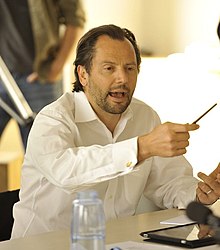You can help expand this article with text translated from the corresponding article in Italian. (April 2024) Click for important translation instructions.
|
| Luigi Zingales | |
|---|---|
 | |
| Born | (1963-02-08) 8 February 1963 (age 61) Padua, Italy |
| Education | Bocconi University (MA) Massachusetts Institute of Technology (PhD) |
| Academic career | |
| Field | Business economics |
| Institution | University of Chicago, U.S. |
| Doctoral advisor | James M. Poterba Oliver Hart |
| Information at IDEAS / RePEc | |
Luigi Zingales (Italian pronunciation: [luˈiːdʒi ddziŋˈɡaːles]; born 8 February 1963) is an Italian academic who is a finance professor at the University of Chicago Booth School of Business. His book Saving Capitalism from the Capitalists (2003) is a study of "relationship capitalism". In A Capitalism for the People: Recapturing the Lost Genius of American Prosperity (2012), Zingales "suggests that channeling populist anger can reinvigorate the power of competition and reverse the movement toward a 'crony system'."
Career
Zingales received a bachelor's degree in economics from Bocconi University in Milan. In 1992 he earned a Ph.D. in Economics from the Massachusetts Institute of Technology with the completion of his thesis, titled The value of corporate control, under the supervision of James M. Poterba and Oliver Hart. In the same year he joined the faculty of the University of Chicago Booth School of Business, where he is the Robert C. McCormack Distinguished Service Professor of Entrepreneurship and Finance. Zingales also serves as a member of the Committee on Capital Markets Regulation. He also co-hosts the podcast Capitalisn't along with journalist Bethany McLean.
Positions
Zingales has voiced support for greater regulation of the banking and technology industries. Perhaps most interesting is his support of the United States debt ceiling, which is almost universally held in low regard by his colleagues.
In July 2012, Zingales took part in the 'No-Brainer Economic Platform' project of NPR's program Planet Money. He supported a six-part reform plan that involved eliminating all American income, corporate, and payroll taxes as well as the war on drugs and replacing the system with a broad consumption tax (including taxing formerly illegal substances).
Zingales generated controversy in 2018 when he invited former White House Chief Strategist Steve Bannon to debate globalization and immigration at the University of Chicago against an undecided expert in the field. The decision sparked protests from students and faculty given Bannon's history of controversial statements.
Studies
His main field of study is business economics, with a heavy focus on organizations and entrepreneurship.
Awards
He was the winner of the 2003 Germán Bernácer Prize to the best European economist under 40 working in macro-finance. In 2012, he was named by Foreign Policy magazine to its list of FP Top 100 Global Thinkers, "For reminding us what conservative economics used to look like."
Books
- Saving Capitalism from the Capitalists, Random House, New York, 2003; Co-authored with Raghuram G. Rajan
- A Capitalism for the People: Recapturing the Lost Genius of American Prosperity, Basic Books, New York, 2012
References
- ^ Zingales, Luigi (1992). The value of corporate control (Ph.D.). MIT. hdl:1721.1/13214?show=full. Retrieved 8 December 2016.
- Postrel, Virginia (4 December 2003). "Economic Scene; Are open markets threatened more by a pro-business or by an antibusiness ideology?". The New York Times.
- "Nonfiction review". Publishers Weekly. 23 April 2012.
- Plender, John (15 April 2012). "Nostalgia for the land of opportunity". The Financial Times.
- Zingales, Luigi (1992). The value of corporate control by Luigi Zingales (Thesis). MIT Library. hdl:1721.1/13214?show=full. Retrieved 17 September 2015.
- "Luigi Zingales". Retrieved 18 June 2012.
- "Committee on Capital Markets Regulation". Retrieved 18 June 2012.
- Zingales, Luigi (29 May 2012). "How Political Clout Made Banks Too Big to Fail". www.bloomberg.com. Retrieved 6 October 2020.
- Register, Orange County (23 January 2013). "Luigi Zingales: Congress needs to keep debt ceiling".
- "Six Policies Economists Love (And Politicians Hate)". NPR.org.
- "Episode 387: The No-Brainer Economic Platform". NPR.org.
- Hogan, Susan (26 January 2018). "Steve Bannon invitation sparks protests at University of Chicago". Washington Post. ISSN 0190-8286. Retrieved 6 February 2018.
- "Bernacerprize". Bernacerprize.
- "The FP Top 100 Global Thinkers". Foreign Policy. 26 November 2012. Archived from the original on 30 November 2012. Retrieved 28 November 2012.
External links
- Roberts, Russ (2 July 2012). "Zingales on Capitalism and Crony Capitalism". EconTalk. Library of Economics and Liberty.
- Appearances on C-SPAN
- Living people
- Massachusetts Institute of Technology School of Science alumni
- Bocconi University alumni
- University of Chicago Booth School of Business faculty
- Italian economists
- Fellows of the American Academy of Arts and Sciences
- 1963 births
- Manhattan Institute for Policy Research
- Writers from Padua
- Italian emigrants to the United States
- Presidents of the American Finance Association
- Fellows of the Econometric Society